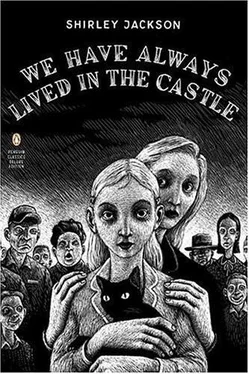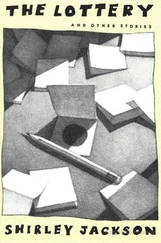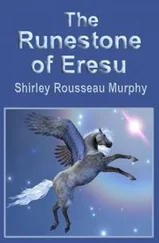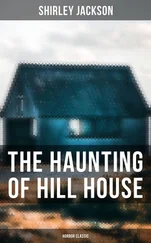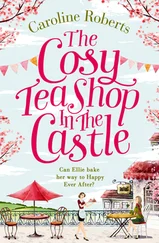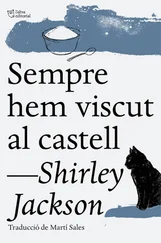Shirley Jackson - We Have Always Lived in the Castle
Здесь есть возможность читать онлайн «Shirley Jackson - We Have Always Lived in the Castle» весь текст электронной книги совершенно бесплатно (целиком полную версию без сокращений). В некоторых случаях можно слушать аудио, скачать через торрент в формате fb2 и присутствует краткое содержание. Город: New York, Год выпуска: 2006, ISBN: 2006, Издательство: Penguin Books, Жанр: Триллер, gothic_novel, на английском языке. Описание произведения, (предисловие) а так же отзывы посетителей доступны на портале библиотеки ЛибКат.
- Название:We Have Always Lived in the Castle
- Автор:
- Издательство:Penguin Books
- Жанр:
- Год:2006
- Город:New York
- ISBN:978-1-101-53065-8
- Рейтинг книги:3 / 5. Голосов: 1
-
Избранное:Добавить в избранное
- Отзывы:
-
Ваша оценка:
- 60
- 1
- 2
- 3
- 4
- 5
We Have Always Lived in the Castle: краткое содержание, описание и аннотация
Предлагаем к чтению аннотацию, описание, краткое содержание или предисловие (зависит от того, что написал сам автор книги «We Have Always Lived in the Castle»). Если вы не нашли необходимую информацию о книге — напишите в комментариях, мы постараемся отыскать её.
is a deliciously unsettling novel about a perverse, isolated, and possibly murderous family and the struggle that ensues when a cousin arrives at their estate.
We Have Always Lived in the Castle — читать онлайн бесплатно полную книгу (весь текст) целиком
Ниже представлен текст книги, разбитый по страницам. Система сохранения места последней прочитанной страницы, позволяет с удобством читать онлайн бесплатно книгу «We Have Always Lived in the Castle», без необходимости каждый раз заново искать на чём Вы остановились. Поставьте закладку, и сможете в любой момент перейти на страницу, на которой закончили чтение.
Интервал:
Закладка:
Shirley Jackson
WE HAVE ALWAYS LIVED IN THE CASTLE
Introduction by Jonathan Lethem
For Pascal Covici
INTRODUCTION
Life in Shirley Jackson’s (Out)Castle
Ten and twenty years ago I used to play a minor parlor trick; I wonder if it would still work. When asked my favorite writer, I’d say “Shirley Jackson,” counting on most questioners to say they’d never heard of her. At that I’d reply, with as much smugness as I could muster: “You’ve read her.” When my interlocutor expressed skepticism, I’d describe “The Lottery”—still the most widely anthologized American short story of all time, I’d bet, and certainly the most controversial, and censored, story ever to debut in The New Yorker —counting seconds to the inevitable widening of my victim’s eyes: they’d not only read it, they could never forget it. I’d then happily take credit as a mind reader, though the trick was too easy by far. I don’t think it ever failed.
Jackson is one of American fiction’s impossible presences, too material to be called a phantom in literature’s house, too in-print to be “rediscovered,” yet hidden in plain sight. She’s both perpetually underrated and persistently mischaracterized as a writer of upscale horror, when in truth a slim minority of her works had any element of the supernatural (Henry James wrote more ghost stories). While celebrated by reviewers throughout her career, she wasn’t welcomed into any canon or school; she’s been no major critic’s fetish. Sterling in her craft, Jackson is prized by the writers who read her, yet it would be self-congratulatory to claim her as a writer’s writer. Rather, Shirley Jackson has thrived, at publication and since, as a reader’s writer. Her most famous works—“The Lottery” and The Haunting of Hill House —are more famous than her name, and have sunk into cultural memory as timeless artifacts, seeming older than they are, with the resonance of myth or archetype. The same aura of folkloric familiarity attaches to less-celebrated writing: the stories “Charles” and “One Ordinary Day, With Peanuts” (you’ve read one of these two tales, though you may not know it), and her last novel, We Have Always Lived in the Castle .
Though she teased at explanations of sorcery in both her life and in her art (an early dust-flap biography called her “a practicing amateur witch,” and she seems never to have shaken the effects of this debatable publicity strategy), Jackson’s great subject was precisely the opposite of paranormality. The relentless, undeniable core of her writing—her six completed novels and the twenty-odd fiercest of her stories—conveys a vast intimacy with everyday evil, with the pathological undertones of prosaic human configurations: a village, a family, a self. She disinterred the wickedness in normality, cataloguing the ways conformity and repression tip into psychosis, persecution, and paranoia, into cruelty and its masochistic, injury-cherishing twin. Like Alfred Hitchcock and Patricia Highsmith, Jackson’s keynotes were complicity and denial, and the strange fluidity of guilt as it passes from one person to another. Her work provides an encyclopedia of such states, and has the capacity to instill a sensation of collusion in her readers, whether they like it or not. This reached a pitch, of course, in outraged reactions to “The Lottery”: the bags of hate mail denouncing the story as “nauseating,” “perverted,” and “vicious,” the cancelled subscriptions, the warnings to Jackson never to visit Canada.
Having announced her theme—Jackson’s first novel, The Road Through the Wall , finished just prior to “The Lottery,” is a coruscating expose of suburban wickedness—Jackson devoted herself to burrowing deeper inside the feelings that appalled her, to exploring them from within. Jackson’s biographer, Judy Oppen-heimer, tells how in the last part of Jackson’s too-brief life the author succumbed almost entirely to crippling doubt and fear, and in particular to a squalid, unreasonable agoraphobia—a sort of horrible parody of the full-time homemaker’s role she’d assumed both in her life and in her cheery, proto-Erma Bombeckian best sellers Life Among the Savages and Raising Demons . However painful her final decade, though, her work enlarges as it descends, from the sly authority of “The Lottery,” into moral ambiguity, emotional unease, and self-examination. The novels and stories grow steadily more eccentric and subjective, and funnier, climaxing in We Have Always Lived in the Castle, which I think is her masterpiece.
“The Lottery” and Castle are intertwined by the motif of small-town New England persecution; the town, in both instances, is pretty well recognizable as North Bennington, Vermont. Jackson lived there most of her adult life, the faculty wife of literary critic Stanley Edgar Hyman, who taught at nearby Bennington College. Jackson was in many senses already two people when she arrived in Vermont. The first was a fearful ugly duckling, cowed by the severity of her upbringing by a suburban mother obsessed with propriety. This half of Jackson was a character she brought brilliantly to life in her stories and novels from the beginning: the shy girl, whose identity slips all too easily from its foundations. The other half of Jackson was the expulsive iconoclast, brought out of her shell by her marriage to Hyman—himself a garrulous egoist, typical of his generation of Jewish’50s New York intellectuals—and by the visceral shock of mothering a quartet of noisy, demanding babies. This was the Shirley Jackson that the town feared, resented and, depending on whose version you believe, occasionally persecuted. For it was her fate, as an eccentric newcomer in a staid, insular village, to absorb the reflexive anti-Semitism and anti-intellectualism felt by the townspeople toward the college. The hostility of the villagers helped shape Jackson’s art, a process that eventually redoubled, so that the latter fed the former. After the success-de-scandal of “The Lottery” a legend arose in town, almost certainly false, that Jackson had been pelted with stones by schoolchildren one day, then gone home and written the story. (Full disclosure: I lived in North Bennington for a few years in the early eighties, and some of the local figures Jackson had contended with twenty years before were still hanging around the town square where the legendary lottery took place.)
In Castle , Jackson revisits persecution with force and a certain amount of glee, decanting it from the realm of objective social critique into personal fable. In a strategy she’d been perfecting since the very start of her writing, that of splitting her aspects among several characters in the same story, Jackson delegates the halves of her psyche into two odd, damaged sisters: the older Constance Blackwood, hypersensitive and afraid, unable to leave the house; and the younger Merricat Blackwood, a willful demon prankster attuned to nature, to the rhythm of the seasons, and to death, and the clear culprit in the unsolved crime of having poisoned all the remaining members of the Blackwood family (apart from Uncle Julian).
The three survivors—Constance, Merricat, and the frail and daft Uncle Julian—dwell together in their grand house at the town’s periphery, rehearsing past trauma and fending off change and self-knowledge. Constance cooks and cleans in a kind of time-struck ritual observance of the missing family’s existence, while Merricat makes her magical forays into the woods and her embattled shopping trips into the center of town, there to contend with the creepy mockery of the village children, who propagate the family history of poisoning as a singsong schoolyard legend. Uncle Julian, dependent on Constance’s care, putters at a manuscript, a family history, in an attempt to make sense of the rupture that has so depopulated his little world. Julian’s a kind of reader’s surrogate, framing questions (“Why was the arsenic not put into the rarebit?”) and offering thematic speculations (“My niece is not hard-hearted; besides, she thought at the time that I was among them and although I deserve to die—we all do, do we not?—I hardly think that my niece is the one to point it out.”) that frame our curiosity about the events that Merricat, our narrator, seems so particularly eager to dismiss.
Читать дальшеИнтервал:
Закладка:
Похожие книги на «We Have Always Lived in the Castle»
Представляем Вашему вниманию похожие книги на «We Have Always Lived in the Castle» списком для выбора. Мы отобрали схожую по названию и смыслу литературу в надежде предоставить читателям больше вариантов отыскать новые, интересные, ещё непрочитанные произведения.
Обсуждение, отзывы о книге «We Have Always Lived in the Castle» и просто собственные мнения читателей. Оставьте ваши комментарии, напишите, что Вы думаете о произведении, его смысле или главных героях. Укажите что конкретно понравилось, а что нет, и почему Вы так считаете.
